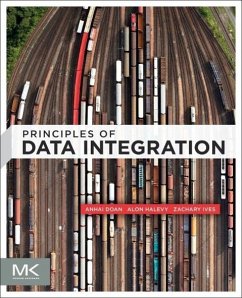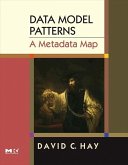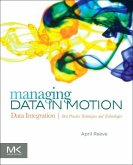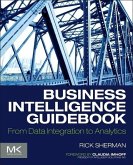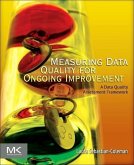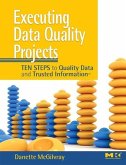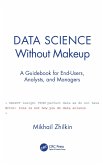Principles of Data Integration is the first comprehensive textbook of data integration, covering theoretical principles and implementation issues as well as current challenges raised by the semantic web and cloud computing. The book offers a range of data integration solutions enabling you to focus on what is most relevant to the problem at hand. Readers will also learn how to build their own algorithms and implement their own data integration application.
Written by three of the most respected experts in the field, this book provides an extensive introduction to the theory and concepts underlying today's data integration techniques, with detailed, instruction for their application using concrete examples throughout to explain the concepts.
This text is an ideal resource for database practitioners in industry, including data warehouse engineers, database system designers, data architects/enterprise architects, database researchers, statisticians, and data analysts; students in data analytics and knowledge discovery; and other data professionals working at the R&D and implementation levels.
Offers a range of data integration solutions enabling you to focus on what is most relevant to the problem at hand Enables you to build your own algorithms and implement your own data integration applications
Hinweis: Dieser Artikel kann nur an eine deutsche Lieferadresse ausgeliefert werden.
Written by three of the most respected experts in the field, this book provides an extensive introduction to the theory and concepts underlying today's data integration techniques, with detailed, instruction for their application using concrete examples throughout to explain the concepts.
This text is an ideal resource for database practitioners in industry, including data warehouse engineers, database system designers, data architects/enterprise architects, database researchers, statisticians, and data analysts; students in data analytics and knowledge discovery; and other data professionals working at the R&D and implementation levels.
Offers a range of data integration solutions enabling you to focus on what is most relevant to the problem at hand Enables you to build your own algorithms and implement your own data integration applications
Hinweis: Dieser Artikel kann nur an eine deutsche Lieferadresse ausgeliefert werden.
"Researchers looking for concise and clear descriptions of the state of the art in data integration will benefit from this noteworthy effort. Graduate students in particular will acquire an excellent blueprint of the field, supplemented by almost 600 up-to-date bibliographic references they can use to further their work." --ComputingReviews.com, October 2013
"Written by three of the field's leading experts, this book manages to address a broad range of topics in its subject domain in a reasonably compact package.The intended audience is primarily academic, specifically graduate and advanced undergraduate students in a university setting. Researchers new to the field will find it to be a helpful introduction." --ComputingReviews.com, August 2013
".a well-organized and thorough treatment of data integration topics is a welcome addition to the practicing software professional's bookshelf. If that treatment is both academically rigorous and still readable, as is the case with this book, it becomes a valuable resource for researchers and, in particular, for doctoral students." --ComputingReviews.com, July 2013
"This is the definitive book on data integration technology, written by experts who invented much of the technology they write about. It's comprehensive, with lots of technical detail very clearly explained. It's a must-read for anyone involved in the development of data integration solutions." --Philip A. Bernstein, Distinguished Scientist, Microsoft Corporation
"Despite having been with us for decades, data integration remains a challenging, multi-faceted problem. This book does an excellent job of bringing together and explaining its many facets along with the technical solutions that have been developed to date. The authors are three of the field's leading contributors, with a mix of both academic and industrial experience, and their presentation includes examples and manages to make even the more theoretical material accessible to readers. All aspects of modern data integration are covered, including different styles of integration, data and schema matching, query processing and wrappers, as well as challenges posed by the Web and the wide variety of data types and formats that must be integrated today. This book should be a great resource for graduate courses on data integration." --Michael Carey, Bren Professor of Information and Computer Sciences, UC Irvine
"The days of enterprises/organizations depending on a single, closed database have given way to a Web-dominated world in which multiple databases must interoperate and integrate. Doan (computer science, U. of Wisconsin, Madison) and colleagues at Google and the University of Pennsylvania address how database ideas have broadened to accommodate external sources of structured information, distributed aspects of the Web, and issues of data-sharing. Part I treats topics and techniques for data queries, integration, and warehousing covered in a database course. Part II discusses extended data representations that capture properties not present in the standard relational data model. Then they present novel architectures for, and trends in, addressing specific integration problems, e.g., of Web sources. Includes an extensive bibliography." --Reference and Research Book News, October 2012
"Written by three of the field's leading experts, this book manages to address a broad range of topics in its subject domain in a reasonably compact package.The intended audience is primarily academic, specifically graduate and advanced undergraduate students in a university setting. Researchers new to the field will find it to be a helpful introduction." --ComputingReviews.com, August 2013
".a well-organized and thorough treatment of data integration topics is a welcome addition to the practicing software professional's bookshelf. If that treatment is both academically rigorous and still readable, as is the case with this book, it becomes a valuable resource for researchers and, in particular, for doctoral students." --ComputingReviews.com, July 2013
"This is the definitive book on data integration technology, written by experts who invented much of the technology they write about. It's comprehensive, with lots of technical detail very clearly explained. It's a must-read for anyone involved in the development of data integration solutions." --Philip A. Bernstein, Distinguished Scientist, Microsoft Corporation
"Despite having been with us for decades, data integration remains a challenging, multi-faceted problem. This book does an excellent job of bringing together and explaining its many facets along with the technical solutions that have been developed to date. The authors are three of the field's leading contributors, with a mix of both academic and industrial experience, and their presentation includes examples and manages to make even the more theoretical material accessible to readers. All aspects of modern data integration are covered, including different styles of integration, data and schema matching, query processing and wrappers, as well as challenges posed by the Web and the wide variety of data types and formats that must be integrated today. This book should be a great resource for graduate courses on data integration." --Michael Carey, Bren Professor of Information and Computer Sciences, UC Irvine
"The days of enterprises/organizations depending on a single, closed database have given way to a Web-dominated world in which multiple databases must interoperate and integrate. Doan (computer science, U. of Wisconsin, Madison) and colleagues at Google and the University of Pennsylvania address how database ideas have broadened to accommodate external sources of structured information, distributed aspects of the Web, and issues of data-sharing. Part I treats topics and techniques for data queries, integration, and warehousing covered in a database course. Part II discusses extended data representations that capture properties not present in the standard relational data model. Then they present novel architectures for, and trends in, addressing specific integration problems, e.g., of Web sources. Includes an extensive bibliography." --Reference and Research Book News, October 2012

